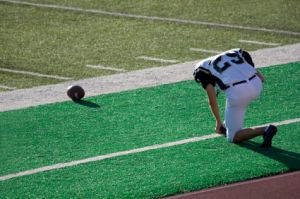 Yet another case of prayer in public school has popped up in the news. This time, the prayers were literally being broadcast over loudspeakers at the beginning of school football games in Hamilton County, Tennessee. It was only after a student present at one of the games contacted the Freedom from Religion Foundation that the prayers ceased. The case further illustrates the ongoing nature of the effort to keep religion out of the state.
Yet another case of prayer in public school has popped up in the news. This time, the prayers were literally being broadcast over loudspeakers at the beginning of school football games in Hamilton County, Tennessee. It was only after a student present at one of the games contacted the Freedom from Religion Foundation that the prayers ceased. The case further illustrates the ongoing nature of the effort to keep religion out of the state.
When a prayer said over the speakers at the beginning of a football game at Soddy Daisy High School, a student who was present wrote the Freedom from Religion Foundation to enquire about what the law stated on the matter. There was no need for the student file a lawsuit, however: Hamilton County Schools Superintendent Dr. Jim Scales ordered an end to the prayers after receiving a letter from Foundation attorney Rebecca Markert which cited numerous U.S. Supreme Court rulings stating that school promotion of religion violated the Constitution. In a tone of seriousness, straightforwardness, and urgency with regard to the football game prayers, Markert ordered the school district to,
commence an immediate investigation into the complaints alleged and take immediate action to stop any and all prayers occurring before any Soddy Daisy athletic events and graduation ceremonies.
In a seemingly compliant and conciliatory manner, Scales consulted his school board's legal team on carrying out a prompt end to prayers recited at public school graduation ceremonies as well as public school athletic events. This resulted in his sending an email to all principals in the district in which he stated that the U.S. Supreme Court has consistently ruled it unconstitutional to carry out prayers over loudspeakers at the football games and that it was incumbent on him and his principals to comply with this legal precedence.
The letter from Markert and the Freedom from Religion Foundation does not ban school prayer, however it merely restricts it to a personal act. Students will still be allowed to pray silently or quietly in groups (as Jesus said in Matthew 6:5-6), and outside class time, so long as they neither proselytize their beliefs to others nor solicit others to adopt their beliefs, and in the case of the Soddy Daisy football team, players will still be allowed to carry out prayers in huddles with consenting members so long as they do not impose their beliefs on others.
Of course, being in Tennessee, the new policy has seen largely disapproving responses from Soddy Daisy students. Ethan Kelley, a student and football player who supports Christian prayer, stated, "Everybody that I know is all for it; they see that good things come from prayer, you know; it's what we do around here", while another player said, "I think before a football game everybody should get together for a prayer to God for everyone to make sure nobody gets hurt, nothing goes wrong".
Apparently, the level of critical thinking, empathy, and self-reflection being practiced at Soddy Daisy amounts more or less to the hum-drum maxim that "everybody should believe what I do" and "everybody does it, 'cause God will heal your sprained knee". But if such students even understood the motivation for the new policy of which they speak, they would know that in fact there was a student who was not "for it", and it was for precisely that reason that that student contacted the Freedom from Religion Foundation. So, no, while everybody they know may be "for" it, not everybody in their school actually is "for" it, and not everybody around there "does" it. Not everybody believes in Christian prayer, even in Hamilton County, Tennessee, otherwise the complaint would not have been sent in the first place. Nor is the question at hand a matter of majority rule: there is no conflict between majority and minority in the first place, since the Christian majority have the opportunity to practice their religion and pray by themselves while allowing the non-Christian students to exercise their right to engage in public school activities devoid of state-sponsored religion. Therefore it is unnecessary and inappropriate for the majority to demand favor.
At any rate, the Universal Life Church Monastery blog will be keeping track of this and other stories on the separation of church and state in the United States, as well as the relationship between church and state in countries around the world. Be sure to check back often for the latest updates on the state of religion, culture, and politics, and how it might affect you and your ministry as a modern-day wedding officiant or nondenominational minister ordained online.
Source:
Newschannel9.com


0 comments